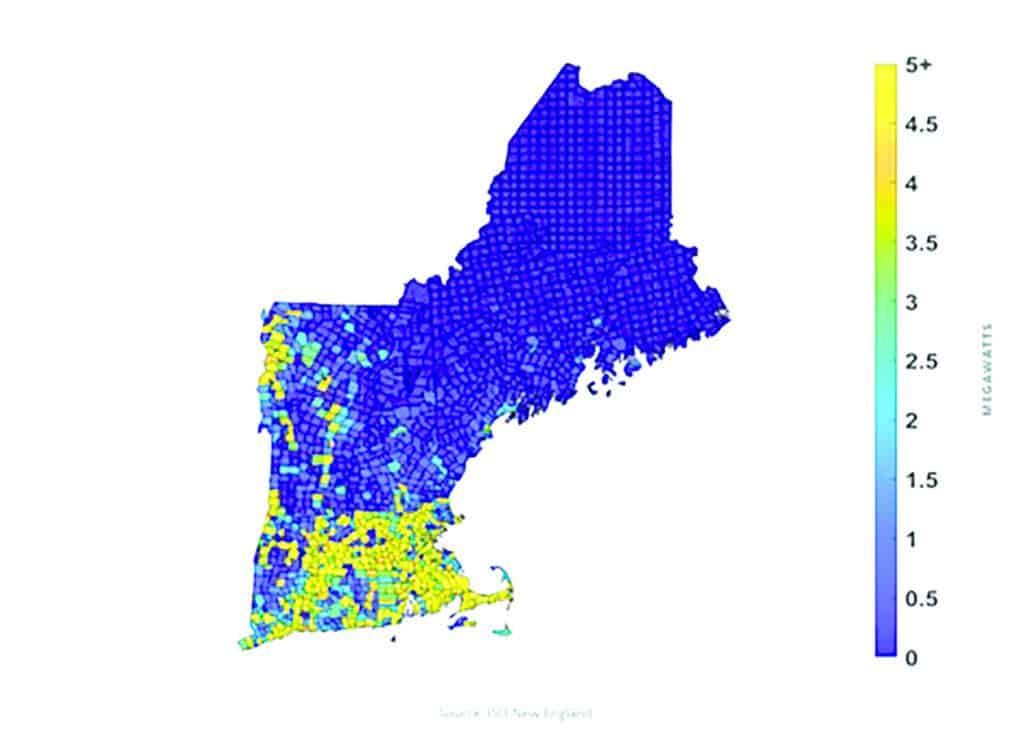
By Bill Bender
What, isn’t Vermont “green?” Of course it is, right?
Wrong.
Green Mountain Power, which is owned by a Canadian natural gas distributor and supplies 70% of Vermont with electricity, claims that its energy supply is 94% carbon free and more than 63% renewable. This sounds great, except that 95% of this electricity is produced in 20th century facilities, many of which (particularly hydroelectric dams) are 50 to 100 years old or more.
Do we really think we can solve the climate change crisis without building new renewables? It is magical thinking, or really worse, as both the state and the major utilities are complicit in misleading Vermonters. Solar produces only 2% of Vermont’s electricity, and wind is negligible (the wind energy generated in Vermont is shipped out of state).
Even worse, Vermont is going backwards.
Permits to build solar, issued by Vermont’s Public Utilities Commission (PUC), declined by two-thirds in the past two years due to the state using Koch Brothers inspired “cost shifting” arguments to cut net metering. The diabolical PUC just dramatically cut the value of solar in Vermont: their action combined with expiring federal tax credits will reduce the value of new solar for Vermont consumers by 40% in just 14 months.
The state has already killed over 400 well paying solar jobs in the past two years, and thousands more are now on the chopping block. That’s hardly how to grow well-paying jobs in Vermont.
Using the analytical framework and regulatory decisions of the Vt. Department of Public Service (DPS) and the Public Utilities Commission, we would all be using landline phones and not be using cell phones. Who reading this does not use a cell phone? Landline phones and cell phones are qualitatively different, even though both make phone calls.
Likewise, residential and community solar are qualitatively different from centralized monopoly controlled utility power.
The thousands upon thousands of Vermonters who have already “gone solar” understand this. There is a different ownership structure, a different environmental stewardship feeling, different resiliency characteristics, different control structures, different sharing options with microgrids, different integration options with home automation, and different options for the future as battery prices plummet and transportation and thermal needs are electrified. Any serious projections of carbon free futures see decentralized generation, ownership, communication, sharing and control as essential. The current analytical framework of the DPS and PUC are based entirely upon a 20th Century electricity grid model, and treat all electricity identically. The regulators are living in the 20th Century; Vermont solar consumers are instinctively in the 21st Century. The early adopters of solar are driving this energy transformation.
This does not minimize the challenges in a transition from a 20th Century grid to a 21st Century grid. However, the vision has to be of the 21st Century, and the job of regulators should be to minimize the economic disruptions during the transition to a 21st Century grid and facilitate it, not to stop the transition.
We can correct such misguided polices by maintaining net metering and building more in-state renewables. This would allow the 20th Century nuclear and hydropower to replace coal plants in other nearby states and provinces of Canada. That is the fastest way Vermont can contribute to the reduction of carbon emissions.
Just one storm, tropical storm Irene, caused $733 million of damage in Vermont. It’s the canary in the coal mine.
There have been decades of largely unheeded warnings about climate change, but the reality is here today in a major way, and is only going to get worse. Does anyone with children or grandchildren truly think 20th Century “renewable” facilities solve our problems for their 21st Century? The state has a legal and moral obligation to be part of the solution rather than part of the problem, which it has been these past two to four years.
Climate change disasters are already here, and the headlines of 2020 are sobering. If the pandemic and politics have distracted you from environmental news in 2020, here is a small sampling of headlines:
Colorado’s two biggest wildfires on record have occurred in the last three months.
September 2020 was the warmest September (worldwide) in 140 years of records, and seven of the warmest Septembers ever have occurred in the past seven years.
California’s largest wildfire ever exceeds one million acres, larger than Rhode Island. This is nearly four times larger than the previous record fire, and five of the 10 largest California wildfires on record are in 2020. More than 4 million acres have burned thus far in California this year, more than all recorded wildfires between 1932 and 1999.
More named storms have made landfall in the U.S. in 2020 than in any previous year.
One of the worst weather events of 2020 was a 700-mile derecho in the Midwest that left 800,000 people without power and destroyed crops for hundreds of miles.
Arctic sea ice reached its second lowest extent in recorded history.
Temperatures hit 100 degrees in Siberia, the hottest on record that far north.
The hottest temperatures ever recorded on earth are in Death Valley and were recorded in 2013 and 2020.
Climate change cannot be mitigated without building new renewable facilities now! Vermont must do its part and legitimize its green reputation. Contact your legislator today and insist that Vermont stop greenwashing. We must maintain net metering and community solar rather than killing solar jobs.
Bill Bender is the president of Solaflect Energy. He grew up in Rutland, graduated from Rutland High School, and then attended Dartmouth College. He then received his Ph.D. in economics from Oxford University (UK) after over a decade of international economics experience. In 2007, he founded Solaflect Energy, a solar company in Vermont, that employs 40 Vermonters, directly and indirectly. For more information visit solaflect.com.



